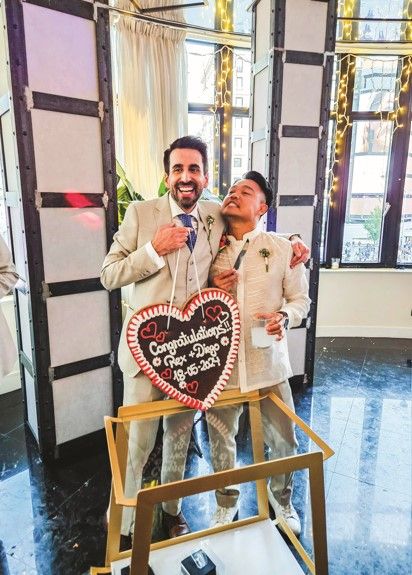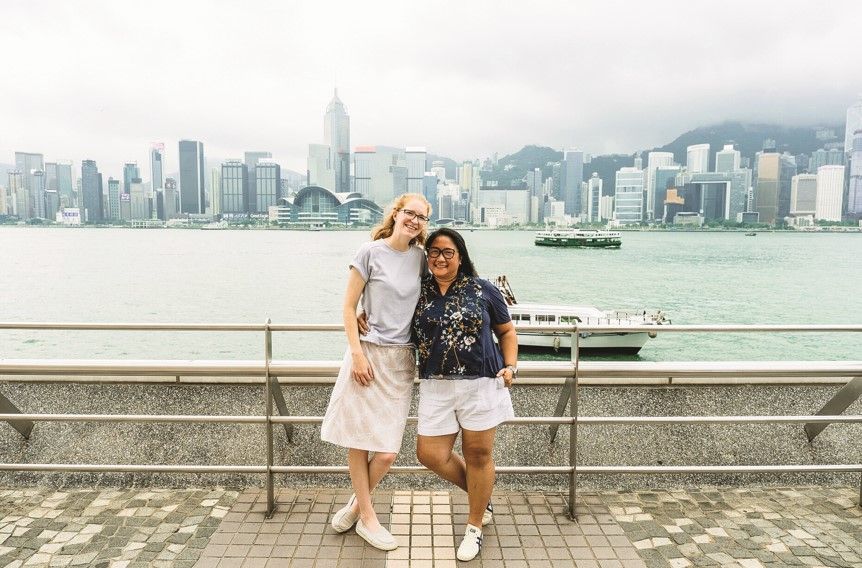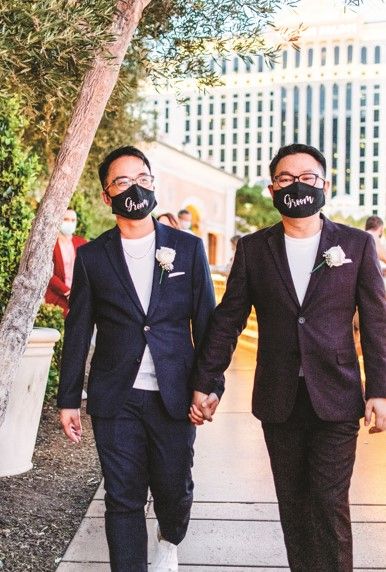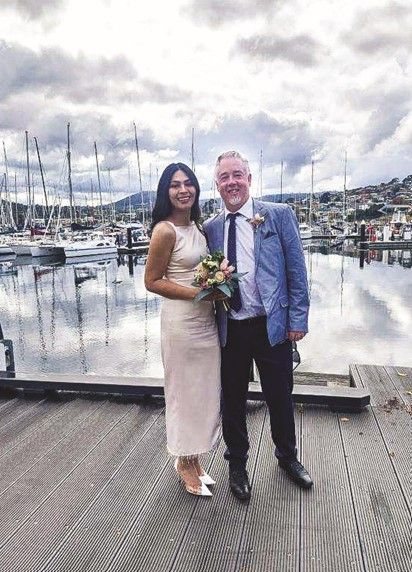Legally after ever
LGBTQ+ couples share thoughts on the importance of being legally married
By MB Lifestyle
by JELLYN GUECO
As we celebrate Pride Month, the Pinoy LGBTQ+ community continues to fight for equal rights including the right to marry. While many countries around the world already recognize same-sex marriage, the Philippines has yet to pass a law that would allow this. Despite this setback, there are LGBTQ+ Filipinos who have been able to legally tie the knot in countries where same-sex marriage is allowed, as they are already citizens or residents there. Let's hear from some of these couples as they share their insights on the importance of being legally married.

Rex (he/him) and Diego (he/him)—Madrid, Spain
The giddiness and excitement of being newlyweds is still evident in Rex's eyes with barely a month since their beautiful ceremony in Madrid. When asked why he decided to get married, Rex said that there is beauty in knowing they have given their commitment in front of their loved ones and are legally recognized as a married couple.
"After six years of being together, being able to make Diego my emergency contact is a huge step for me. It may sound simple but it's amazing to have someone call my husband—someone who will be able to legally speak for me and decide for me when I'm not able to," Rex explains.
At their wedding, Rex's dad walked him down the aisle, something that he never thought would happen. Like most parents, Rex knew that they were worried that he'd grow old alone and get bullied by people.
"My parents, especially my dad, told me when I first came out that they worried about me being gay not because they didn't accept me but because they didn't want me to get hurt," said Rex. "Out of seven siblings, I was the only one who had a wedding ceremony and I was the only one my dad walked down the aisle. I guess getting married is not only about me feeling secure but also giving that comfort to my parents that someone will be with me for the rest of my life."
Rex believes that while getting married is not a guarantee, having this option available to the LGBTQ+ community is synonymous with freedom. "I've always believed that freedom is not about just being able to do whatever you want but being able to do it when you choose to. It’s about having a choice,” he said.

Rollyn (she/her) and Katie (she/her)—New Jersey, United States
It was a match made on Match! That was what Rollyn believed because the same day she wanted to deactivate her online dating account, Katie activated hers. "Katie’s profile actually said that she was looking for a wife!" Rollyn laughed. After six months of being together, they got engaged and are now married for five years.
"Legal marriage gave us the peace of mind knowing that, if anything happened to either of us, the other one would be treated by the law as a legal spouse with all the rights to inherit or be named as a beneficiary in any insurance policy," Rollyn, a lawyer, said. "Marriage was also important for me personally as being married to Katie gave her legal rights with regards to my biological children—that she becomes, in the legal sense of the word, a stepparent to them and not just 'Mom’s girlfriend or partner'. It also reinforced the label 'family' around us in the eyes of the public."
Rollyn believes that it's about time for same-sex marriages to be legalized in the Philippines. "We are all in search of love, family, and commitment, regardless of gender. Right now, LGBTQ+ couples in the Philippines can get married in other countries but they have to accept the fact that it would not be legally recognized the minute they go back home to the Philippines to live there."
This was a roadblock Rollyn faced when she wanted to change her last name on her Philippine passport but the consulate in New York refused to do so as her marriage is not recognized in the Philippines. "All my other documents and legal papers had my married name save for that one document. It was disheartening that my own birth country is still held hostage by the Catholic Church when it comes to issues like same-sex marriage and divorce."

Jay (he/him) and Gerry (he/him)—Vancouver, Canada
When Jay and Gerry first dated 16 years ago, same-sex marriages were only recognized in a handful of countries. Gerry, who loves watching wedding videos, said that it was just a dream for him to be able to exchange vows with Jay one day.
After moving to Canada, it became possible for the two of them to tie the knot. It was on their 12th year anniversary when they decided to marry in Las Vegas. "When we say 'to have and to hold, for better or worse, in sickness and in health', we wanted that commitment to become a reality for us. And we can only do that if we are both legally responsible for each other," Gerry shared.
Jay agrees that being married is a commitment on another level. "Having our marriage legally recognized gave us a sense of security and peace of mind not only in our relationship but also for our future together," he said.
Their advice to other LGBTQ+ couples? Choose love. "Keep choosing and fighting for love. This might sound cliché, but most of the time there is a lot of temptation in our community. So, before you consider legal union, make sure that the person that you are legally committing to is someone that you cannot live without."

Rally (she/her) and Grant (he/him)—Melbourne, Australia
When Rally met Grant, she had been very straightforward and honest from the start that she intended to get married and start a family. "Growing up in the Philippines, it was instilled in me that marriage is not a possibility for people like me. That every gay/trans person will be the one taking care of their parents and grow old alone. It all changed when I moved to Singapore and realized that it could happen, that I could legally get married and have a family of my own," Rally said.
Now together for seven years and married for over a year, Rally said that being married means everything has become possible for them, "We can now have shared assets, shared bank accounts and even consider adoption in the future."
For Grant, legal marriage meant securing their future together in Australia. "It recognized our relationship as a couple who are dedicated to one another, who love one another, and that our relationship is as legitimate as any hetero/cis relationship. It also means Rally is recognized as an Australian in the future and guarantees our future in Australia together."